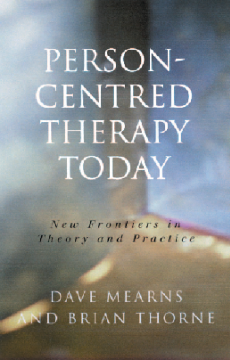
Additional Information
Book Details
Abstract
`This is a book that is rooted in the origins of person-centred therapy but stands at the cutting edge of new ideas developing in this tradition. It will reinvigorate those of us already immersed in this tradition. It should convince newcomers of the vitality and potential of this approach to therapy' - Tim Bond, University of Bristol
`This book is clearly a labour of love by two authors with unique abilities and unparalleled experience: readers will be educated, inspired and encouraged in their own dialogue with the person-centred approach'- Charles J O'Leary, Denver, Colorado
`Mearns and Thorne have done Rogers proud in suggesting how person-centred theory and practice can, without losing its essence, evolve in new directions' - Richard Nelson-Jones, Director of the Humanistic Cognitive Institute, Chiang Mai
Person-Centred Therapy Today represents a significant contribution to the development of the person-centred approach. It will be read by teachers and students of counselling and psychology who wish to keep their knowledge of the approach fully up to date and by all who consider themselves to be person-centred in their approach to helping clients.
`At the risk of being directive, I would say you should buy this book. It contains some of the most stimulating and refreshing ideas to have emerged in the person-centred literature since On Becoming a Person '- Person-Centred Practice
`This book is a "must have" for all person-centred therapists and for trainers and therapistsin other approaches who are genuinely interested in wanting to understand more about person-centred therapy in the 21st century. It is a book to be proud of, and describes innovations in model that all person-centred therapists can feel proud to be associated with' - British Journal of Guidance & Counselling
`This is a book that is rooted in the origins of person-centred therapy but stands at the cutting edge of new ideas developing in this tradition. It will reinvigorate those of us already immersed in this tradition. It should convince newcomers of the vitality and potential of this approach to therapy' - Tim Bond, University of Bristol
